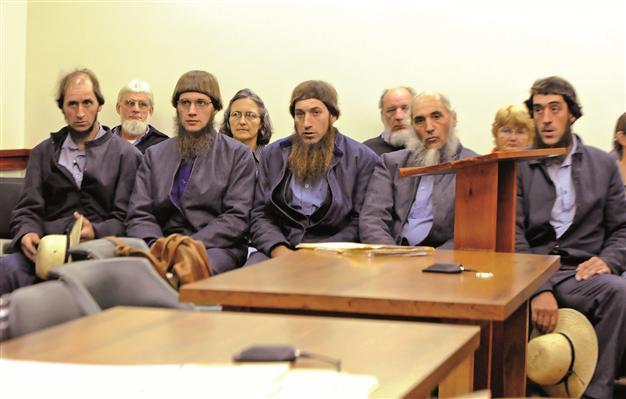Amish sect found guilty of hate crime
CLEVELAND, Ohio

Amish clan members are seen during a trial in Ohio in this file photo. AP photo
The leader of a breakaway Amish group and 15 followers were convicted of hate crimes in the U.S. state of Ohio yesterday for a series of beard-cutting attacks against rivals in the community.
A federal jury found 66-year-old Samuel Mullet Sr., the leader of the breakaway settlement of 18 families in Bergholz about 160 kilometers from Cleveland, guilty of orchestrating the cuttings last fall in an attempt to shame mainstream members of his community who he believed were straying from their beliefs. His followers were found guilty of carrying out the attacks, which terrorized the normally peaceful religious settlement that aims to live simply and piously.
The Amish eschew many conveniences of modern life, including electrical appliances and automobiles, and embrace their centuries-old roots, The Associated Press reported.
“The evidence was that they invaded their homes, physically attacked these people and sheared them almost like animals,” said U.S. Attorney Steven Dettelbach. “Our community and our nation must have zero tolerance for this type of religious intolerance,” according to Agence France-Presse. Beards and long hair are sacred symbols of an Amish follower’s devotion to God, and to cut them is humiliating. The five separate raids were mainly carried out at night. In one of the attacks, an Amish woman testified that her own sons and a daughter who lived in Mullet’s community cut her hair and her husband’s beard in a surprise assault.
Prosecutors said that since the crimes were violent and involved kidnapping, the minimum sentence was 17 years behind bars. Sentencing was set for January 24, 2013, the U.S. Justice Department said in a statement. Prosecutors plan to file a request on Sept. 21 to revoke bond for defendants who had remained free pending trial.
Defense attorneys said the defendants were bewildered by the verdicts and said likely appeals would be based on a challenge to the hate crimes law.
